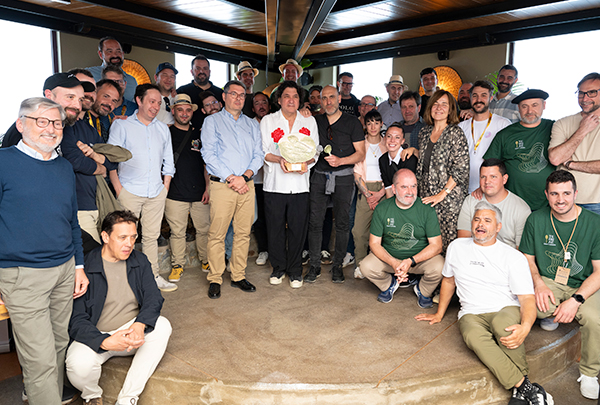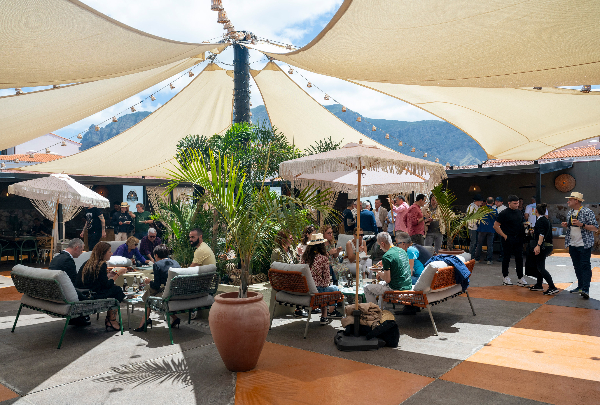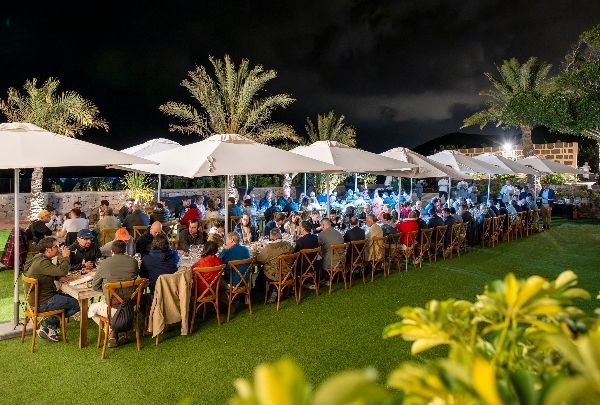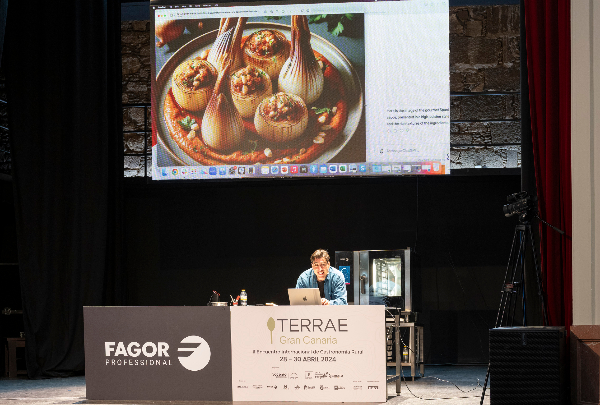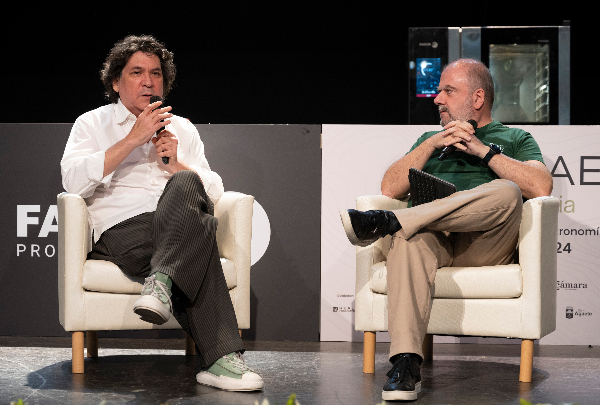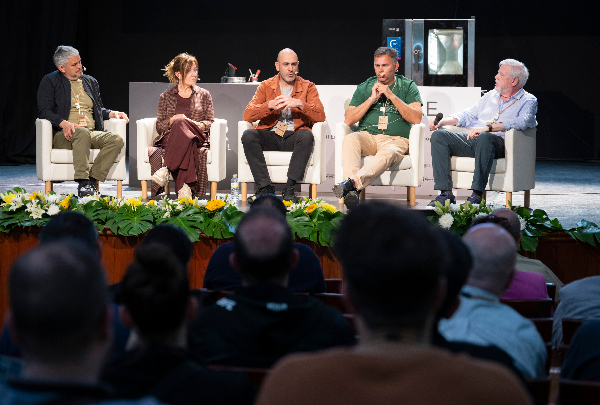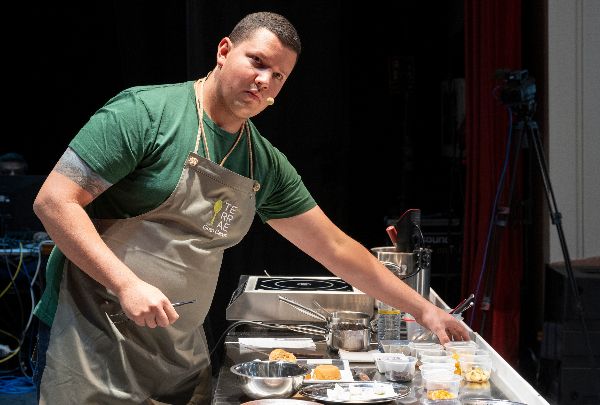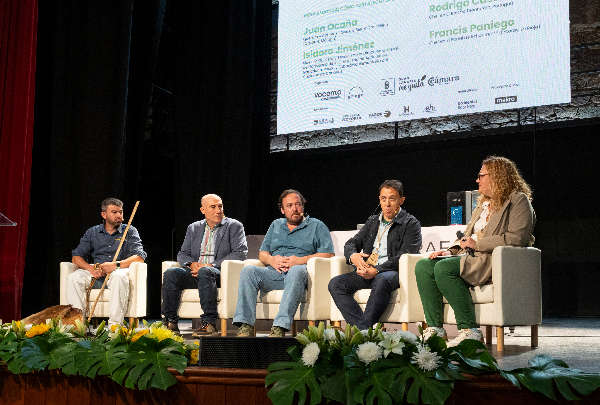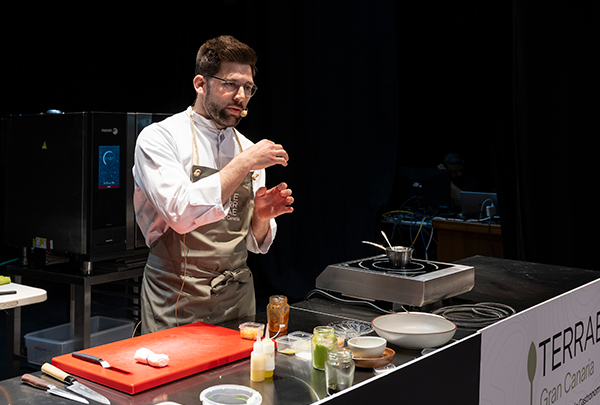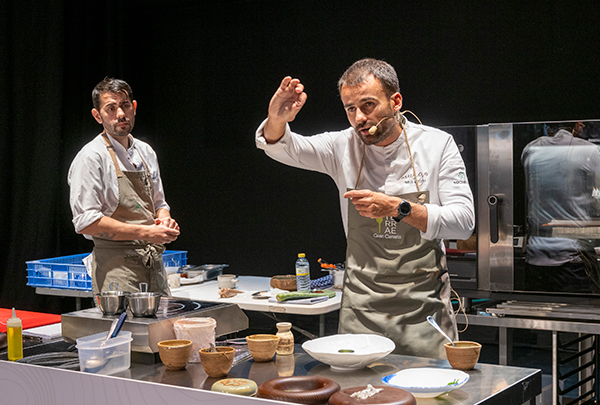News
The new rurality in Terrae
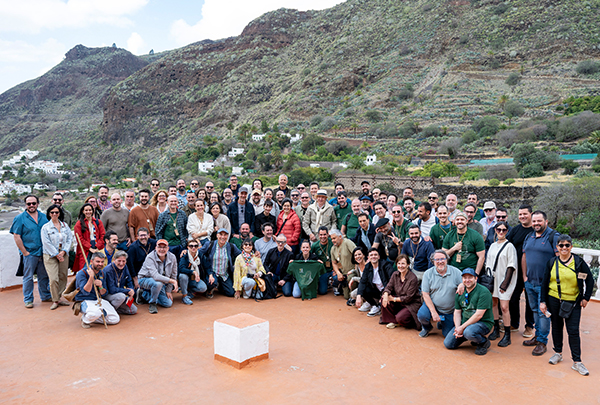
Herds controlled by drones, goats equipped with digital tracking devices or artificial intelligence to control the water footprint of a dish are the present and future of the rural environment.
Juan Ocaña is a goatherd who makes Sierra Crestellina cheese (Casares, Málaga). He inherited a herd of 400 Payoya goats, a breed in decline, but he kept about 60 to optimise his work and make it organic. Today he controls them with drones and a device that allows him to locate them. "If there is cover," he warns, he does not take out his club or slingshot.
Technologies that facilitate his work as a farmer of a breed in danger of extinction, although he denounced at the 2nd International Meeting of Rural Terrae Gastronomy, which is taking place in Gran Canaria, that what is really in danger of disappearing is his profession, because "there is no generational replacement; we will end up seeing a goatherd embalmed in a museum".
There is no public aid that would allow him to erect a virtual fence, for example, and the authorities do not take into account the important work of the goatherds in controlling forest fires or the population fixation in a village with a cheese factory that attracts visitors and buyers. "The countryside is becoming more and more depopulated, less and less cared for, and this also means a loss of historical memory," he laments.
Perhaps AI will encourage people to return to these tasks, but what is clear to Eneko Axpe, who has worked at NASA and explored the application of artificial intelligence in gastronomy with Eneko Atxa (Azurmendi***), is that it is the future: "It's just another tool, like the mobile phone or the Internet, but much more revolutionary. We have to take away the fear of change and see it as a tool that is already very useful".
For example, in production, where there are already autonomous tractors controlled by AI that "allow you to work 24 hours a day" and in extreme weather conditions; it also allows "intelligent crop improvement" by feeding the tool with data on the land and climate to determine which varieties would grow more and better, or "measuring to the millimetre the use of water in a Spain where 78% of the territory is at risk of desertification".
In distribution, he predicts that food will be transported by autonomous lorries and that there are already start-ups to reduce waste, with cameras installed in restaurant waste to identify and quantify waste, analysis of sales data and stock levels in supermarkets, or applications such as To good to go, which connects consumers with businesses to buy perishable products or food that would otherwise be thrown away at more affordable prices.
As for restaurants, Axpe pointed out that AI can inspire new aesthetics of dishes, create new formulas - Coca Cola has already used it for a new flavour - and inspire elaborations, as happened at Azurmendi with a black olive Carolina. They are also using it to create healthier and more sustainable dishes and are working with the University of Berkeley on a project to create menus for dysphagia patients.
It can also be used to identify the products that have the biggest carbon footprint so that they can be avoided, and to identify allergens.
The testimony of Juan Ocaña and the new solutions proposed by Eneko Axpe were just some of the many contributions to be heard during the second day of Terrae, the most reflective of this edition, which also included the official opening of the Terrae Gran Canaria Congress by the island's Director of Industry and Commerce, Juan Manuel Gabella, and the first deputy mayor of Gáldar, Julio Mateo, in the city's Teatro Consistorial.
"The Congress begins with a series of training sessions that have a lot to do with Gran Canaria and our programme, Gran Canaria Me Gusta, because that is who we are; here we are talking about local products, about going back to the source, because we are agriculture, livestock and fishing, and that is where we come from," said Gabella.
"Gáldar has always been committed to agriculture and livestock, which have been fundamental to its economy throughout its history, and we are grateful for opportunities such as Terrae Gran Canaria, which allow us to develop more future projects for our products, such as bananas or flower cheese, with the help of the best international chefs," said Mateo.
Rural chefs
Borja Marrero's cuisine is characterised by his "controlled obsession with the territory". He started out seven years ago with the restaurant Texeda (Tejeda), based on the family farm, and later moved to Las Palmas with Muxgo, where he is currently working with two products that are very alien to the mainland: the prickly pear cactus, whose flavour ranges from lemony to bitter, depending on its age, and the bark of the Canary Island pine, which he turns into powder.
Some examples are mackerel in pine bark and herbs with tomato water, prickly pear tartar with its cream and lemon milk, sea bass with trebolina pilpil, toasted demi-glace and Canary pine bark caviar, or millefeuille of the same bark with sheep's milk custard.
The farm also makes its own cheeses, the most original of which is Pinocha, a cheese matured in pine bark, and one made with the skins of coffee grown at the highest altitude in Europe.
The Herdade do Esporão*, in the Portuguese Alentejo, is located in the middle of a vineyard and the philosophy of its chef, Carlos Teixeira, is "the integral use of the product of the territory". The chef, who described himself as "one of the children of Terrae" because his participation in the first edition gave him the knowledge to focus his restaurant, pointed out that his work consists of adapting to nature, avoiding food waste, composting, eliminating plastic waste and basing his dishes "50% on our vegetable garden and 50% on local producers, so that there is room for everything".
In this rural restaurant there is no menu, as it depends on what arrives each day, and they work with invasive species such as pike-perch, seasoned with garum from its entrails, and crayfish, an example of the integral use of food, including bones, scales and shells.
From the Alentejo, we travelled to Antioquia with the presentation of Miguel Warren, who brought to the stage his project Gesto, with which he moved from the city to the countryside, 40 minutes from Medellín (Colombia). He did this after realising that there was no point in travelling around his country looking for ingredients when he could produce them himself and take advantage of Antioquia's vast larder. His guiding principle is to "grow, cultivate and transform".
For example, they raise Sampedreño pigs, a "very lost" local breed, from which they make sausages, but also dishes such as pork with mushroom water, oil and powdered mushrooms, and salted egg yolk sauce with aji charapita; Tongue confit in smoked oil with raw pumpkin, its flowers and seeds, vinaigrette with sour orange and sweet orange segments; purple beans cooked in reduced pork bone stock with cabbage and powdered pig's blood and, for dessert, leg jelly with panela, spices, fruit and cocoa shell powder.
"Simple dishes that appeal to the countryside and to pleasure, making the most of the product," he defined.
Tribute to Gastón Acurio
The Peruvian chef Gastón Acurio was honoured for positioning Peruvian cuisine on the world stage alongside the country's producers, with initiatives such as Mistura, a meeting that has been a kind of gastronomic independence for Peru, awakening national pride in the recipe book and local ingredients.
In an interview with Benjamín Lana, director of Vocento Gastronomía, he stressed that all this had been possible thanks to the union of chefs who did not see themselves as competitors but as allies, and who had succeeded in giving prestige to the work of small local producers.
Acurio stressed this point: "The chef's job is not to negotiate the price with the farmer, but to accept the price that the farmer considers fair; to respect the minimum sizes, the closed seasons, to buy everything that is brought to you...".
In this way, he said, "cooking will always be a weapon with a future".
Round tables
There was also time for debate in the form of round tables, such as the one that brought together Francis Paniego, El Portal de Echaurren** (Ezcaray, La Rioja), Rodrigo Castelo, from the restaurant Ó Balcao (Santarém, Portugal) and Isidoro Jiménez, master cheesemaker and technician at the General Directorate of Livestock of the Department of Agriculture, Livestock, Fisheries and Food Sovereignty of the Government of the Canary Islands.
They highlighted the commitment of rural cuisine to small artisans, called for administrative support for promotion, advocated cooking with invasive species in order to protect native ones, and highlighted the work of restaurants in promoting quality products and small-scale production.
In another round table, Maria Solivellas of Ca Na Toneta* (Caimari, Mallorca) defended rural cuisine as offering "more reality" than that dominated by large investment groups in the cities. "We create culture and we preserve it," she said, calling for "the kind of support that the cultural sector receives".
Nandu Jubany (Can Jubany*, Calldetenes, Catalonia) gave up the fight and defended as another way of achieving sustainability "paying farmers well so that they don't disappear and help them to prosper".
For his part, Luis Alberto Lera, from Lera* (Castroverde de Campos, Zamora), pointed out that "it is much more complex to create a restaurant in a small village than in a city", that rural work is "undervalued" and that restaurants in depopulated areas have an important "socio-economic impact on their surroundings".
For Víctor Lugo, owner of the restaurant Casa Romántica, Finca la Laja and Bodega Los Berrazales (Agaete, Gran Canaria), "customers want to know more about the product and this is better in rural areas", where relations with producers are closer.


